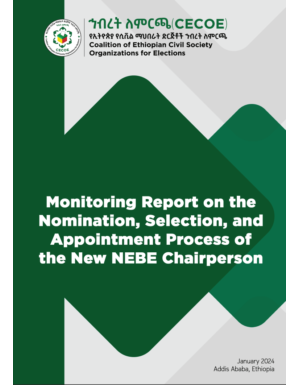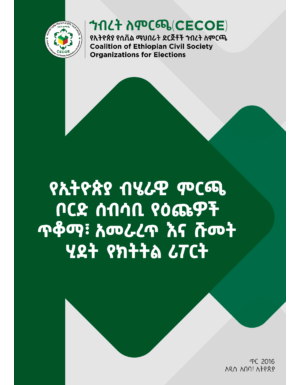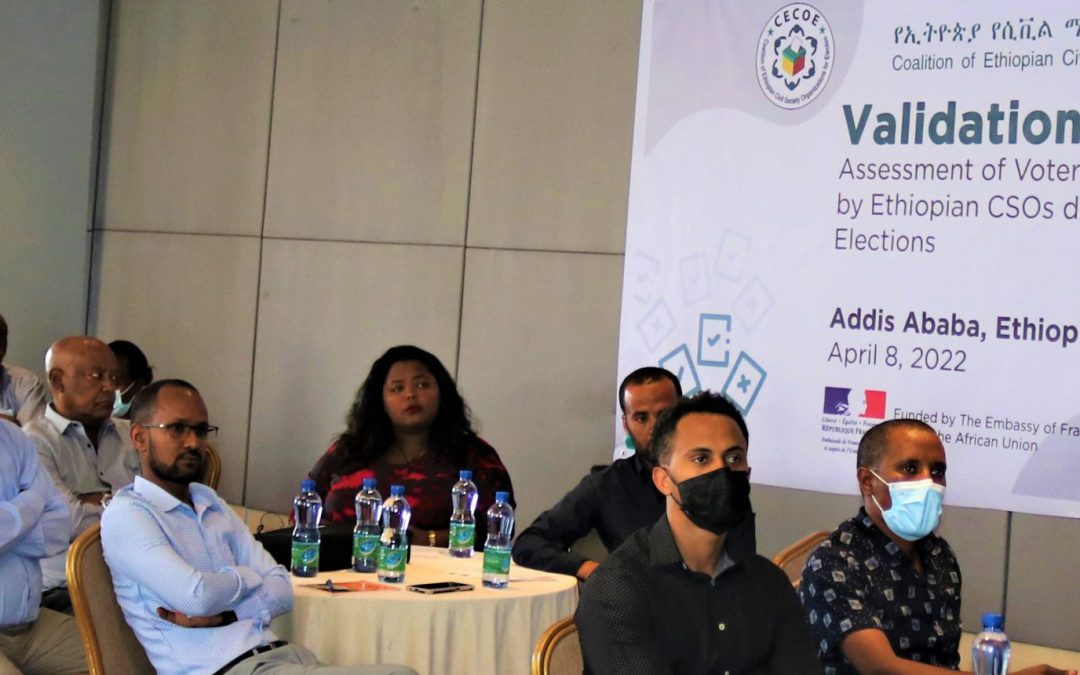
Apr 24, 2023 | news
CECOE held three consecutive validation workshops on April 5, 7 and 8, 2022 on assessments it conducted on Voter Education, NEBE’s directives and CECOE’s comprehensive citizens election observation project. Nearly 150 participants who came from different parts of the country attended the workshops. The purposes of the workshops were to share CECOE’s assessments findings with the participants and receive their comments.
Validation Workshop on: Assessment of the National Election Board of Ethiopia Directive on Local
Elections Observation and Voter education
This workshop was held on April 5,2022 and was attended by university lecturers pulled from different law schools across the country. The general objective of this assessment was to identify the normative and challenges related to domestic election observation in Ethiopia with specific emphasis on assessing the National Electoral board of Ethiopia- NEBE’s directive on Local Election Observers’ Accreditation, Working Procedure, Code of Conduct and Voter education.
Validation Workshop on: Assessment of the Implementation of CECOE’s Comprehensive Citizens’ Election Observation
With the aim of gathering an insight into the strengths and weaknesses that CECOE registered in the implementation of its comprehensive election observation project, this assessment has the purpose of serving as a learning mechanism for future citizen election observation projects that will be implemented by CECOE as well as other domestic observation groups.
Validation Workshop on: Assessment of voter education activities by Ethiopian CSOs during the
6th general elections
This study has explored the voter education and information activities conducted by local Civil Society Organizations (CSOs) under the new legal framework for elections and civil society engagement in Ethiopia. As voter education is an integral element of all democratic elections, the coalition conducted an assessment on voter education programs implemented by CSOs. To that end, the coalition collected data from CSOs, trainers and other participants of voter education initiatives during the Sixth General Elections, as well as interviewing key informants from the NEBE, CSO sector and the media in order to gain insight into the qualities and shortcomings of voter education activities conducted by local CSOs.
Once all the comments from the participants have been incorporated, the three assessments will be made available to key stakeholders both in print and online versions.
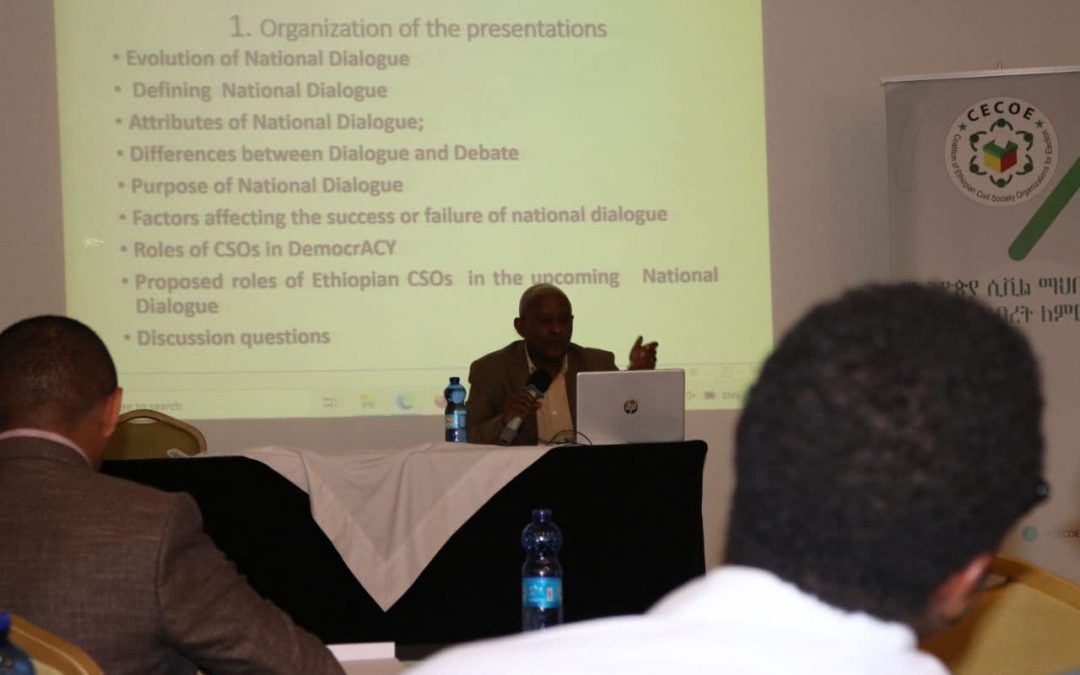
Apr 24, 2023 | news
On March 10, 2022, CECOE in partnership with NDI organized a one-day consultative forum on “The Role of CSOs in National Dialogue”. The objective of the forum was to raise the awareness of CSO actors on National Dialogue and actively engage them in the process. The forum was moderated by Biniam Abate, CECOE program manager. Speakers at the forum included Dr. Henock Seyoum, Dr. Henok Seyoum, Deputy General Secretary, House of People’s Representatives (HPR) of Ethiopia and Abera Hailemarim, CEOCE’s Executive Director.
In his presentation, Dr Henock elucidated over the need for a national dialogue and procedures passed before the passing of the proclamation and establishment of the commission. Prior to the formation of the national dialogue commission, a number of preparatory works such as review of legal documents, historical narratives, organizational structures and best international experiences were thoroughly examined, according to Dr. Henock.
Following the presentation, several questions were raised by the participants regarding the independence of the commission; the selection process of the commission’s members; approaches to conduct the national dialogue, and the impacts of active conflicts going on in different parts of the country. According to the presenter, the study that was conducted prior to the establishment of the commission had already addressed the concerns raised by the participants. Furthermore, he stressed that some of the ideas raised during the discussion would be taken as inputs and incorporated to further strengthen the effort.
The second presentation by Abera Hailemariam, CECOE Executive Director, was mainly focused on the evolution of national dialogue and the roles CSOs should play to make the National Dialogue successful. “The evolution of National Dialogue formed its initial conceptions in eastern and central Europe in the post-cold war period, from the growing discontentment of the gap between citizens and ruling elites,” he expounded. There are three key factors that affect the success or failure of National Dialogue efforts such as: Support of elites, Support of the public, Support of regional and international actors. He also proposed some roles that CSOs should play in the upcoming national dialogue.
Some of the major proposed roles are:
- Setting Agenda
- Providing info to the public in processes of ND
- Forwarding recommendations on policy
- Establishing relations between the general public and the national dialogue commission
- Watchdogging the national dialogue process
- Organizing consultations b/n CSO leaders and NDC
Note:
As supporting the country’s democracy building effort is one of CECOE’s organizational goals, the coalition intends to contribute its own fair share to make the national dialogue a success. To that end, CECOE has planned to organize a series of events whereby various germane stakeholders deliberate on the planned national dialogue. To get latest updates on the events, please follow CECOE on Twitter (@CecoeEth) and subscribe to our newsletter using this link www. cecoe/newsletter.org
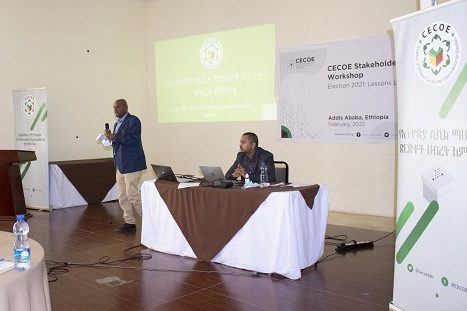
Apr 24, 2023 | news
On 10 February 2021, a bilateral consultative meeting was held between CECOE’s and NEBE’s representatives who came from different regional offices of the NEBE. The meeting was held under the theme “Elections 2021: Lessons learned”.
In his opening remarks, CECOE’s acting director, Abera Hailemariam, highlighted on major activities of the coalition in the areas of: election observation, voter education and election media monitoring. Following the director’s remark, three different presentations were made by CECOE’s program experts, detailing the various aspects of the coalition’s election programs.
The first presentation addressed CECOE’s voter education project, which reached several millions of Ethiopians through mainstream and social media outlets. Moreover, in the presentation it was indicated that the coalition facilitated and streamlined conditions for its members to deliver voter education to over 2 million Ethiopians. In a bid to capacitate its members, CECOE had also provided a number of trainings to its members on voter education. As a result, this effort has borne fruit and set an example to many CSO coalitions and NGOs that have vested interests in elections.
Covering most part of the presentation, the second presenter elucidated over CECOE’s election observation, observation findings and recommendations to NEBE. The majority of the recommendations suggest that NEBE should capitalize on its strong sides, and remedy gaps that are worth rectifying.
This consultative meeting is the first of four other planned consultative meetings with key stakeholders. In the coming few weeks, CECOE will hold similar consultative meetings with its partners, political parties and media representatives and member organizations.
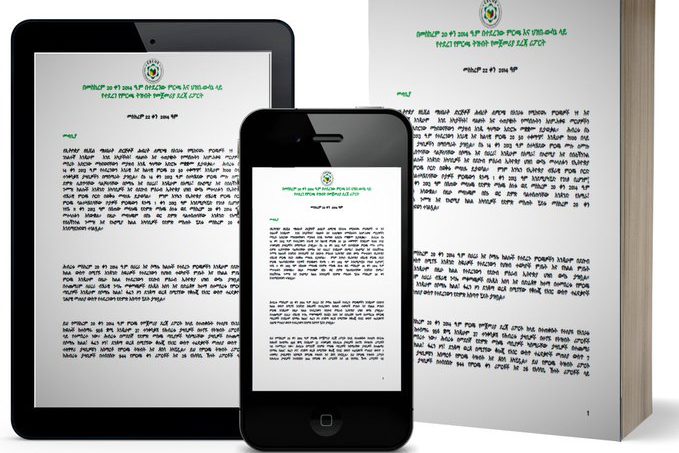
Apr 24, 2023 | news
On 2 October 2021, Coalition of Ethiopian Civil Society Organizations for Election (CECOE) released its observation report on the September 30 elections and South-western Ethiopian people referendum. The 16 pages report has seven sections which expound the election process, and measures that need to be taken to rectify problems in the process.
Highlights of the report :
Arrival at Polling Stations
To assess if polling station officials got to the polling stations in time to open , CECOE observers were instructed to arrive at polling stations by 5:30 AM. Most (97%) of observers reported that when they arrived at their respective polling stations, electoral officers were present preparing to open the stations. Read more on CECOE’s website.
Opening of Polling Stations
According to the NEBE, polling stations are supposed to be open for voters from 6 AM to at least 6 PM. Recognizing the importance of observing these opening and closing times, CECOE collected information in this regard and assessed the environment in which polling stations were opened for voting. Read more on CECOE’s website.
The Voting Process
After polling stations open and are set up by electoral officers, the next integral step in the electoral process is the voting process. On 30 September 2021, most polling stations were opened by 7 AM as noted above, staying open for voting until 6 PM in polling stations across Somali and parts of the SNNP regional state where voters cast ballots for regular House of People’s Representatives (HoPR) or Regional Council elections. Read more on CECOE’s website.
The Counting Process
Counting is the final step on election day. After the closing of polling stations, electoral officersare tasked with the duty of making sure all ballots are accounted for and counting is done at polling stations except in circumstances where postponing counting is allowed by law. Read more on CECOE’s website.
Reporting on Critical Incidents
In addition to collecting data on the voting and counting process in polling stations across the three regions under CECOE’s current observation exercise, the Coalition also collected critical incidents on election day. Incident types observers are asked to look out for on election day include not being allowed to observe, the establishment of polling stations in forbidden locations, absence or shortage of electoral materials, the suspension of voting and counting and other procedural and security related issues. Read more on CECOE’s website
IDP Settlement Voting
One of the most interesting aspects of this round of voting was the decision by the NEBE to hold elections in the Qoloji IDP Settlement site, where some citizens have been displaced since 2016. Recognizing the importance of enfranchising internally displaced persons, CECOE trained and deployed seven observers including members of its assessment team to evaluate the voting and counting process in the 41 polling stations established in the Qoloji Settlement site. Read more on CECOE’s website
Conclusion
The Coalition of Ethiopian Civil Society Organizations for Elections (CECOE) deployed 956 stationary and 37 mobile observers for the 30 September 2021 elections, including 7 mobile observers in IDP settlements. The coalition has observed the positive and negative aspects of the voting and counting process on 30 September 2021. Read more on CECOE’s website
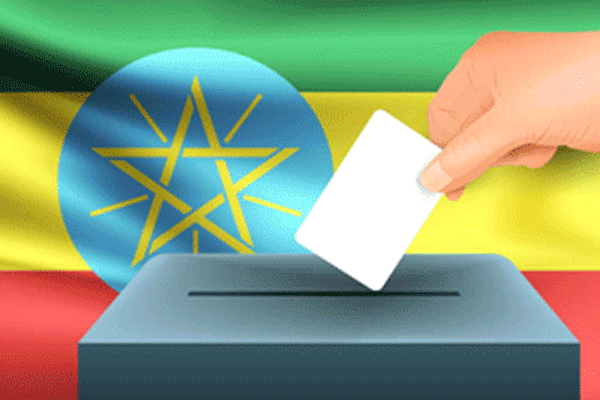
Apr 24, 2023 | news
As the post-election phase is an integral part of any democratic elections, CECOE is observing the post-election environment in parts of the country where elections and referendums were held on 30 September 2021.
CECOE is conducting the post-election environment observation by deploying 50 highly trained observers. Using the checklist, they are provided with, the observers will assess if there are disputes over the probity of the election process or complaints on the official results. Furthermore, due to the nature of election cycles communicating elections and referendum results may be a long-drawn-out process. This characteristic of elections makes post-election observation instrumental in the bid to observe elections systematically.
CECOE’s post-election observation will last for three consecutive weeks, and during this period each observer will send six observation reports to the data center. Once all the data collected from observers, it will be cleaned, organized and analyzed using the Apollo software. The findings of the post-election observation will be incorporated in CECOE’s final election report and announced to all germane stakeholders and the general public in the coming few weeks.






